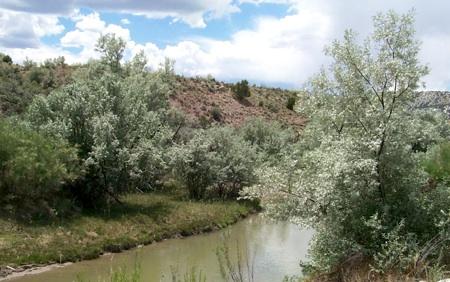Russian-olive can be an interesting addition to your landscape, with its dense coat of silvery leaves, bright yellow flowers, and relatively compact stature. But it also is a non-native tree that can overwhelm native vegetation, hog water, and disrupt nutrient cycles. In Utah, the National Park Foundation is helping combat this invasive by providing funding to a coalition trying to eradicate Russian-olive from public lands in the southern part of the state.
The Escalante River Watershed Partnership was born during a June meeting in Boulder, Utah. At the meeting were staff from Glen Canyon National Recreation Area, Grand Staircase-Escalante National Monument, Dixie National Forest, the Nature Conservancy, the state of Utah, and local businesses and organizations. The encroachment of Russian-olive on both public and private lands along the Escalante River and its tributaries is resulting in ecological and economic losses and is causing adverse impacts to recreation opportunities.
On October 30, in Escalante, Utah, the partnership came together again to organize into working groups and develop an action plan to achieve their goals. Although the Escalante River Watershed Partnership is still in its infancy, there are plans to help local businesses and landowners with weed problems on their lands, and to provide native plants that can be used to replace the Russian-olives. The partnership will work to obtain funding and assist local landowners who are interested in removing exotic weeds from their properties, and to provide training and skills for local youth in the field of land restoration.
Additional meetings of the Escalante River Watershed Partnership are planned for spring 2010. For further questions call John Spence at (928)608-6267 or email [email protected]


 Support Essential Coverage of Essential Places
Support Essential Coverage of Essential Places







Add comment